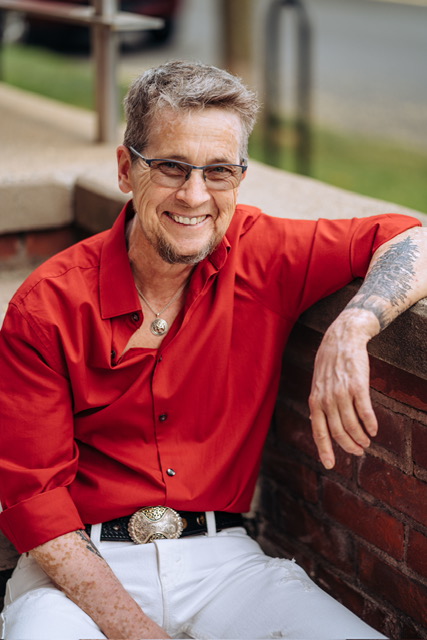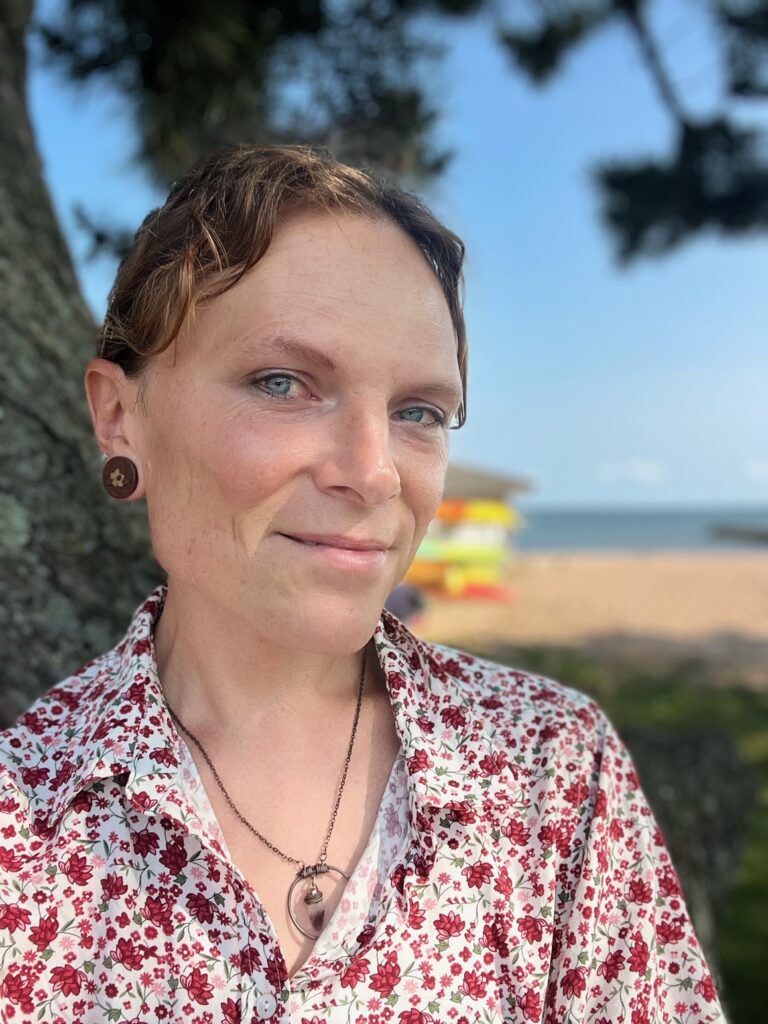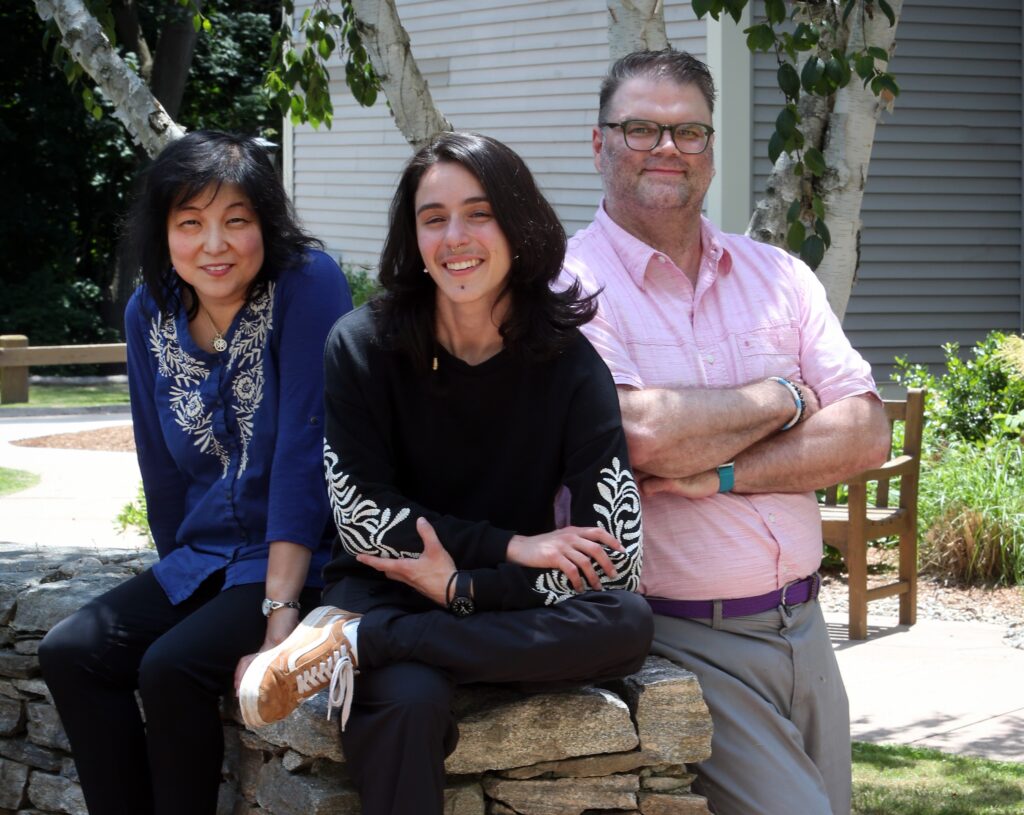By Jane Latus
“Home.” That’s what Acie Wolfson of West Haven says they found.
“A sense of belonging, family, people similar to myself” are what Damien Allen of Newington gained, he says.
Wolfson attends a support group for nonbinary and gender nonconforming people offered by Middlesex Health. Allen attends a group for trans men. Middlesex also offers groups for trans women and family members.
These gatherings have changed their lives enormously, both say. “When I measure how much I’ve grown from the group, it’s incredible. Incredible!” says Wolfson. “This one hour gives you the energy to go on. We talk about pain and struggle, but for some reason I still leave feeling lighter. Because I know I’m not alone.”
“Before joining, I didn’t know another trans person,” says Allen. Thanks to the group, he now has good friends who are trans and talks to—and hangs out with them—outside of meetings. The group was especially helpful at his age (57 when he started attending a few years ago) because, he says, “The younger set is more accepting. People my age just don’t get it.”
Anyone 18 and up is welcome to attend these sessions, and you don’t need to be a Middlesex Health patient. Meetings are monthly, free, and online. Newcomers might appreciate knowing they won’t be required to talk; they can just listen, the facilitators say.
In a time when some want to erase trans and gender nonconforming people from existence, queer people in Connecticut worry about whether it could happen here, says Michael Miarecki, LCSW, the primary mental health clinician for trans patients at Middlesex. He works closely with Teo Grimaldi, the gender medicine program navigator who facilitates Middlesex’s male, female, and nonbinary support groups.
Times like this make it more vital that our identities are acknowledged and, beyond that, celebrated, says Grimaldi. “We’re all validating each other’s sense of anxiety,” and sharing ways to manage it, he says. But they also make room for light-heartedness. It’s not all struggle, Grimaldi says. “There’s joy within the experience.”

The many rewards of community
People attend for a variety of reasons, say Grimaldi and Miarecki, including: Relatability, meeting people who have had the same experiences and feelings. Advice from people who’ve been there on everything from how to navigate coming out at work to issues with family members.
Information and resources. A sense of camaraderie. A place to celebrate each other’s wins, like going shirtless outdoors for the first time, or the elation at being correctly gendered by a barista. Reassurance that you too will be ok. A family. Friends.
It’s a place to talk about what’s going on in your life, not just about your identity, says Grimaldi.
Allen says he found the family and sense of belonging he craved, plus more. “I enjoy listening to people. I’m always learning new stuff.” He also has met trans people in successful romantic partnerships, making him realize “There’s hope for me.” And although his biological family is “mostly” supportive, he says it’s a relief to spend time with people who share what he’s experiencing.
“As much as the news would like us to put our constant energy into existing, it’s nice to have a space to talk about our favorite ice cream flavor. You can talk about normal stuff without being queer being all-consuming,” says Wolfson. Elsewhere, in a world where they’re either “sir’d” or “ma’am’d” (and therefore always misgendered), they are constantly forced to explain themself.
Wolfson appreciates that Middlesex offers a group for a full range of gender nonconforming folks. “Lots of support groups are more on the binary edges, and you don’t quite fit in either one.” They are emphatically grateful for the opportunity: “We get to be thankful for the space we have, while acknowledging the struggle. Some days it’s hard to function.”
Especially for those who aren’t fully out in the world, the support group is a place where members are seen as they really are, says Wolfson. “We deserve the visibility, to be heard, and to feel like we fit.”

Families transition, too
There is also a families/allies or friends support group. It’s mostly attended by parents, but other relatives and friends of trans and gender nonconforming people participate as well. It is led by Terry Kang, LMFT, who runs Middlesex Health’s adult intensive outpatient program, and Miarecki.
Kang says she’s amazed by the progress she’s seen in the five years she’s been leading the group. Participants arrive more aware of the language and process surrounding being trans or nonconforming, and there is less judgment and criticism.
Still, she notes, parents come with fears. Some of those might be expected as they confront these issues, but some are exacerbated by negative political rhetoric amplified in mainstream and social media.
They come with questions, lots of questions, and it’s a safe place to ask them, says Kang, as well as the place to get answers. How do puberty blockers work? Where do I find a doctor? How do we handle a bully at school? How do we approach school administration?
Many parents are grieving the loss of the person they knew as their son or daughter. “They worry they’ll lose the person they’ve known for so long,” says Grimaldi. “Yeah, they’ll lose the depressed part of that person. They’ll meet the happy person.” He tells parents it’s okay to feel sad and that they’re supporting their child by showing up.
One reassuring message parents learn from each other and Kang is that their child won’t change too quickly, too slowly or with regrets, because there is a team of medical professionals working with them and their child to determine the course and pace of care.
Pronouns frequently come up: how to adjust to them, what to do about family members who resist them, and what to do when kids come up with their own, unique ones. “Just use the pronouns!” says Grimaldi.
Most importantly, Kang tells parents, “Talk to, listen to, and love your child.”
Middlesex Health’s Center for Gender Medicine and Wellness serves more than 1,200 transgender and gender nonconforming patients. It provides hormonal therapy, behavioral health services, continence and public health, gender transition surgery, physical therapy, infectious disease testing and treatment, and voice therapy.
The Human Rights Campaign has awarded Middlesex Health several consecutive “LGBTQ Healthcare Equality Leader” designations.
Meeting dates and times are on the Middlesex Health Center for Gender Medicine and Wellness website, MiddlesexHealth.org/gendermedicine. To sign up for the family/friends group, email Michael.Miarecki@midhosp.org and for all other groups, email Teo.Grimaldi@midhosp.org.





More Stories
Grindr and Tinder and Scruff, Oh My!
Liat Feller: Living As Intersex
Improve Your Wellbeing through Self-Compassion